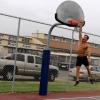I agree with the people who suggested MSM. I would say to try plain MSM powder dissolved completely in water maybe with a little vitamin C powder. Take it twice a day on an empty stomach. Wait until absorbed before eating. Source Naturals, Jarrow and UltraBotanicals are good brands. You can work up to a teaspoon or two at time if you can tolerate it.
Boswellin or Boswellia is another good one.
Avoid NOW vitamins. I often find them to be ineffective.
Type II collagen is a possibility. NeoCell is one brand. You have to open the capsules and dissolve it thoroughly in water, again, maybe with a little powdered vitamin C. Take it on an empty stomach. Wait til is is absorbed to eat.
Shou Wu Chi Chinese tonic is another possibility. HEI brand, in the yellow box, is a good one. It can contribute to high blood pressure in the eyes and face for some people. Stop taking it if that happens. It can also become an aphrodisiac. Watch out for that. It might take a while for that to happen, though.
Watch out for an acidic diet. That is bad for you. Try not to drink sodas. Try to eat steamed green vegetables every day.
Silica is another possibility. BioSil by Jarrow is a good one.
Bone Up by Jarrow is a good mineral supplement.
If you can swim safely, that might help.
If you can find alternatives to prescription drugs and drug store anti-inflammatories, that might be better. There are alternatives.
StimTien, from the informercials, might help. They have a sixty day money back guarantee. I believe that they honor it.
Acupuncture and prescribed chinese herbs might help. I would not let them put the needle in the injured area, or too close to it, personally.
Sounds like you are already making some impressive efforts. I hope you find a solution.
Good luck.
Edited by Luminosity, 21 August 2011 - 03:46 AM.




















































